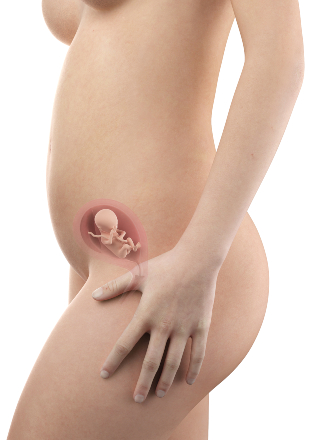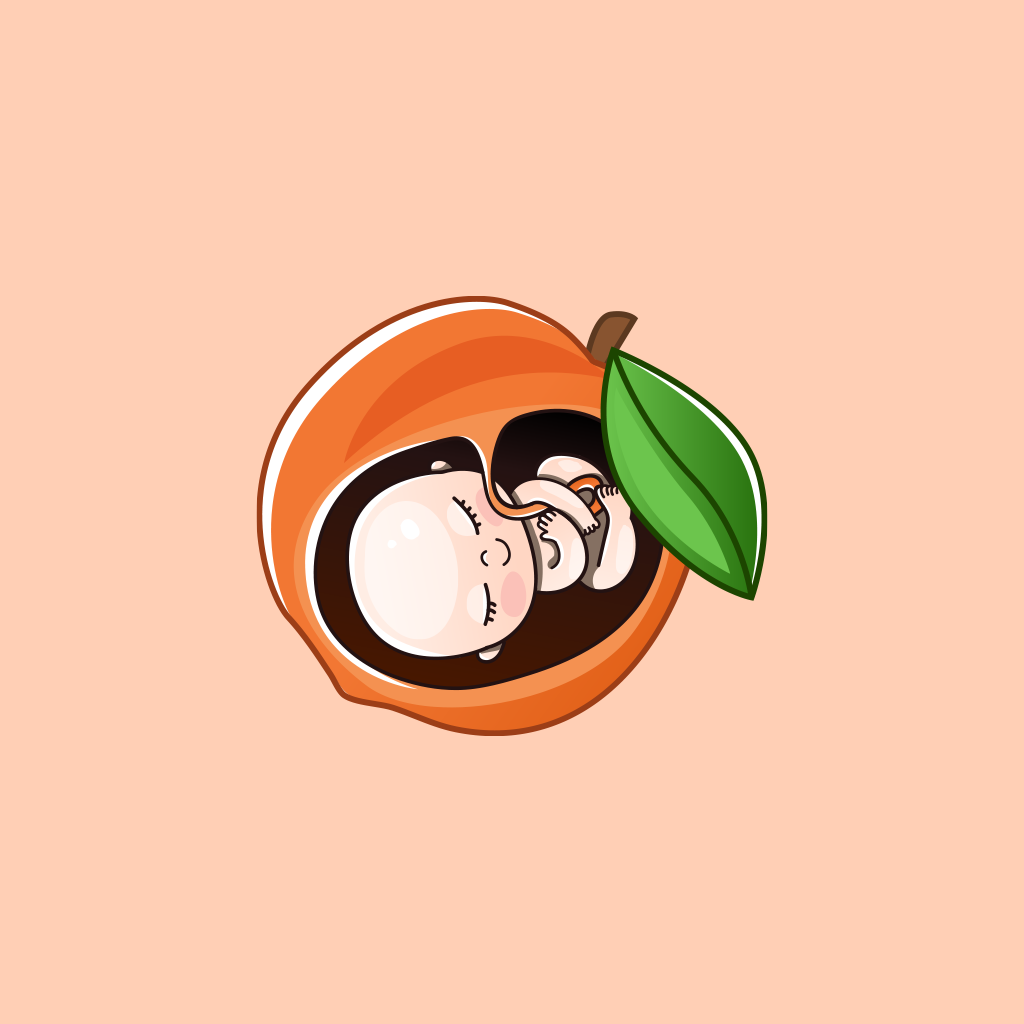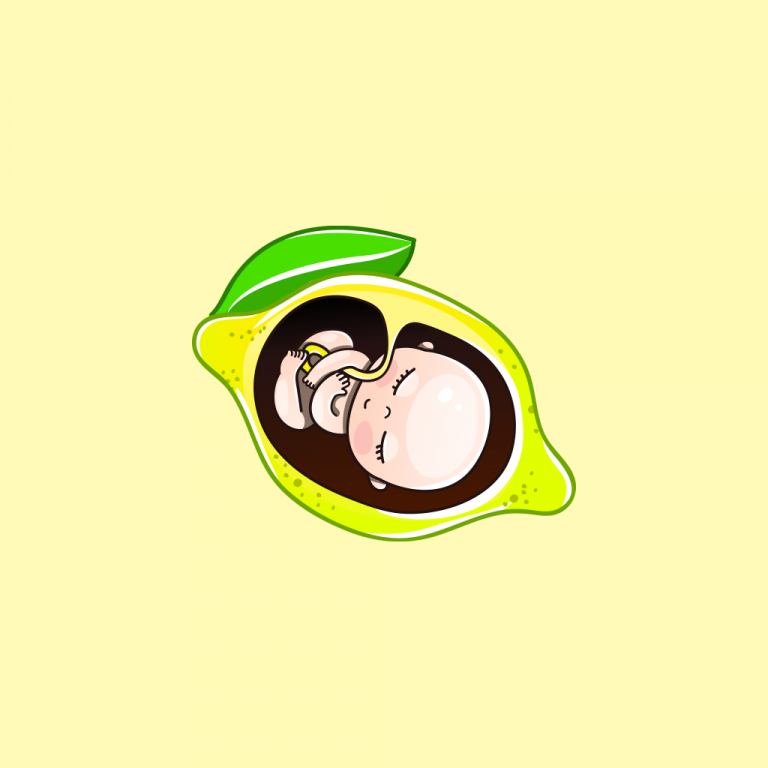Welcome to Week 14, the start of your second trimester! Many moms-to-be find this week brings a gentle turning point. You might notice your energy returning and those early pregnancy discomforts, like morning sickness, start to fade. If you’re still feeling tired or queasy, be gentle with yourself—every pregnancy unfolds in its own unique way.
At this stage, your baby is around the size of a peach and growing quickly. The little one’s features are becoming more defined, and things like tiny eyebrows and hair may be starting to appear. Inside your belly, your baby is wiggling and even starting to practice facial expressions—although you probably won’t feel those flutters just yet.

You might also start to notice subtle changes in your own body this week. Many women see the beginnings of a baby bump as the uterus rises above the pelvis, and some find their skin feels different—perhaps glowing, maybe more sensitive, or even a little dry. These changes are all part of your body’s hard work supporting new life.
This can also be a good time to focus on comfortable routines and healthy habits. Even if you’re feeling better, it’s important to drink lots of water, eat balanced meals, and find gentle ways to stay active—think short walks or simple stretches. Small actions like these can help you manage common symptoms like mild swelling or constipation, which sometimes pop up around now.
- Give yourself permission to rest when needed. Energy levels can still vary from day to day.
- If you’re seeing your healthcare provider around this week, bring any questions about your pregnancy or changes in your body.
- Consider starting or updating a pregnancy journal. Not only is it a lovely way to mark this special journey, but it can also help track new feelings and milestones.
Remember, every pregnancy moves at its own pace. Whether your symptoms are easing up or lingering a bit longer, trust that your body knows what it’s doing. Take a moment to appreciate everything you and your baby are accomplishing. You’re moving into an exciting new chapter, and there’s so much to look forward to!
Your Baby’s Development This Week
Welcome to week 14! This is an exciting chapter as your baby keeps growing stronger and more active inside your belly. Many moms describe this stage as a turning point where everything starts to feel more real—and your baby is transforming in amazing ways with every passing day.
This week, your baby is about the size of a kiwi or a navel orange—small enough to fit in your hand, but big enough for you to start imagining the little person they are becoming. Their body measures around 3.5 to 4 inches from head to bottom, and they’re growing rapidly both inside and out.
One of the most remarkable changes is that your baby’s face is looking much more like a newborn now. The ears are moving into their final positions on the sides of the head, and the eyes, although still closed, are inching closer together. The tiny chin isn’t tucked on the chest anymore, thanks to a growing neck, and their head is sitting more upright. All of these details add up to a more familiar, baby-like profile for that future ultrasound picture.
If you could take a peek inside, you’d be amazed to see a fuzzy layer of soft hair, called lanugo, starting to form on your baby’s skin. This gentle coating acts as a warm, protective jacket for now and will cover most of their body for the next several months. Tiny fingernails and toenails are done developing—they’re delicate, but already resemble what you’ll see when you meet your baby in person.
Another important development this week: your baby’s thyroid gland starts to work, making key hormones that help guide healthy growth from now through birth. Amazingly, the liver is also stepping up, creating bile (which the body won’t actually use until your baby is out in the world).
- Busy Movements: Little one is practicing all kinds of coordinated movements now, often stretching, turning, and even making slow, gentle kicking motions. Their hands might move up to their face, and you may be happy to know that they’re starting to make facial expressions—squinting, frowning, or even grimacing in response to sensations and signals in the womb.
- Reflexes at Play: If your baby’s hand or foot gets touched, it will automatically curl or tighten. These natural reflexes are part of preparing for life outside the womb.
- Practicing Skills: Sucking and swallowing movements are underway as your baby learns how to breathe and swallow amniotic fluid. These actions are critical rehearsals for feeding after birth.
- Digestive Progress: Inside those tiny intestines, special structures called villi are growing. These will later help absorb nutrients from food once your baby is born and starts eating.
- Eye Movements: Although their eyelids are sealed shut, gentle, sporadic eye movements are starting to happen, and these will increase over the next few weeks.
This stage is really about practice—your baby is mastering mini moves and building the vital organs, muscles, and nutrients storage needed to thrive. While you won’t feel these movements just yet, trust that your little one is becoming more active every day. Each step of development brings both of you closer to that first unforgettable meeting—and you’re doing a wonderful job nurturing this exciting transformation.
Changes in the Mother’s Body
Welcome to week 14 of your pregnancy! You’ve entered the second trimester, a time many women find more comfortable and enjoyable than those first whirlwind months. As your body adapts to support your growing baby, you’ll likely notice some changes—some obvious, and some more subtle. Here’s what you might experience and what it all means for you and your little one.
One of the most exciting changes around this time is that your baby bump often starts to become more noticeable. For many moms, it feels like your belly “pops out” almost overnight. If you’ve been keeping your pregnancy a secret, you may soon find it harder to hide as your uterus grows and rises above your pelvic bone. This visible change is a sign that your baby is getting bigger and your body is doing exactly what it’s supposed to!
Your breasts are also going through changes. You may find they feel heavier or fuller than before. Around this time, they might start producing a thick, yellowish substance called colostrum. This is your body’s very first practice at making milk, and it’s perfectly normal. You might not notice it at all—or you may see small spots in your bra. Either way, your body is preparing for feeding your baby after birth.
Many women experience small skin tags—tiny, soft growths—especially under the breasts or in areas where skin rubs together. They’re harmless and usually go away after pregnancy, but if you have questions or they become bothersome, don’t hesitate to mention them at your next appointment.
As your uterus grows, you might feel brief aches or sharp, pulling sensations on the sides of your lower belly. This is usually due to your round ligaments stretching and is completely normal at this stage. These feelings often show up when you move quickly, stand up too fast, or sneeze. If these pains become severe or are accompanied by other symptoms like bleeding, always let your provider know.
Your energy may be making a comeback! Many women notice that they don’t feel as tired as they did in the first trimester, and queasiness often fades away. With less nausea, your appetite may return—or even increase. This is a great time to focus on including more healthy snacks and balanced meals in your day.
Here are a few other changes that some mothers notice during week 14:
- Glowing skin: Increased circulation and pregnancy hormones can give your skin a rosy, vibrant look—which some people call the “pregnancy glow.”
- New hair growth: You might find your hair looking thicker or growing faster thanks to hormonal changes.
- Milder emotions: While mood swings can happen, many women find their emotions feel more stable now than in the early weeks.
- Mild congestion: Some moms develop a stuffy nose due to increased blood flow to the nasal passages. This is both common and harmless, though it can be surprising.
As your body keeps changing, remember: every pregnancy is different. Some women notice all these changes, while others experience only a few. Most importantly, take care of yourself, rest when you need it, and don’t hesitate to ask your healthcare provider anything you’re wondering about. You’re doing a wonderful job!
What Medical Checkups and Screenings Do You Need at 14 Weeks?
At 14 weeks pregnant, you’ll find yourself in a very exciting stage of your pregnancy journey! Now that you’re heading into your second trimester, your doctor or midwife will focus on making sure both you and your baby are healthy and thriving. Here’s what you can expect when it comes to checkups and screening in week 14:
- Routine Prenatal Visit: Most moms-to-be will have a regular appointment around this time. At your visit, your healthcare provider will usually:
- Check your weight and blood pressure to monitor your health.
- Listen for the baby’s heartbeat with a small handheld device—this is usually the first time you’ll hear that special sound!
- Ask about any new symptoms or concerns you might have.
- Ask about your nutrition, activity levels, and answer any questions you’re wondering about.
- Screening Tests (As Needed): Depending on your age, health history, or results from earlier tests, your provider might discuss extra screenings to check on your baby’s development. For example:
- Second Trimester Blood Tests: These sometimes start in the next few weeks (between 15 and 20 weeks), but your doctor may talk about them ahead of time. They look for signs of conditions that can affect your baby, like certain birth defects.
- Amniocentesis: If you are age 35 or older, or have specific risk factors, your provider might mention this test. It checks for chromosomal conditions like Down syndrome. The test itself is usually done between weeks 15 and 18, but it’s common for your doctor to start the conversation around week 14 so you have time to consider your options and ask questions.
- General Health Monitoring:
- Many moms notice an increase in energy around this time! Still, your care team will want to know if you’re experiencing anything unusual, like sudden headaches, vision changes, or swelling—these are worth mentioning, even if you think they’re minor.
- If you’re feeling good, that’s wonderful! Keep track of any changes and jot down any questions for your next visit. No worry is too small to share.
As you move into the heart of your pregnancy, these regular checkups are the best way to keep both you and your baby well. They’re also a great opportunity to build a trusting relationship with your provider—so don’t hesitate to talk about how you’re feeling, physically and emotionally. Your doctor or midwife is there to help you every step of the way.
Nutritional Tips and Physical Exercise
At 14 weeks, you might feel a welcome boost in energy. This is a great time to pay closer attention to your nutrition and physical activity, both of which play a big role in your baby’s healthy development and in helping you feel your best.
- Fill Your Plate with Color: Eating a variety of colorful fruits and vegetables means you’re getting a mix of vitamins, minerals, and fiber. Try adding spinach to your omelet, blueberries to yogurt, or carrots as a crunchy snack.
- Choose Whole Grains: Instead of white bread or rice, try swapping in whole grains like oats, brown rice, or whole wheat pasta. These options provide steady energy and help keep your digestion regular.
- Focus on Protein: Proteins are building blocks for your growing baby. Add foods like eggs, beans, chicken, fish (low in mercury, like salmon), tofu, or lean beef to your meals. Even snacks like Greek yogurt or nuts count!
- Keep Hydrated: Your blood volume is increasing, so sip water throughout the day. Aim for about 8-10 cups, but listen to your body—if you feel thirsty, drink up! If plain water gets boring, try adding slices of citrus, cucumber, or mint.
- Smart Snacks: Your appetite may pick up now. Prepare healthy, easy-to-grab snacks like cheese sticks, whole grain crackers, fresh fruit, or trail mix to help curb hunger between meals.
- Add Iron-Rich Foods: As your baby grows, you’ll need more iron. Include lentils, spinach, meat, fortified cereals, and dried fruit. Pair iron-rich foods with vitamin C (like an orange or bell pepper) to help your body absorb the iron better.
When it comes to physical activity, many moms feel more comfortable moving around now that early pregnancy discomforts have eased. Staying active is good for your mood, helps you sleep better, and can make delivery a bit easier when the time comes.
- Embrace Gentle Movement: Walking is wonderful and easy to fit into your day—even a few short walks add up. If you enjoy group activities, consider prenatal yoga or swimming, which are both gentle and help with muscle strength and flexibility.
- Listen to Your Body: If you feel tired, dizzy, or uncomfortable, it’s okay to slow down or take a break. Pregnancy isn’t the time to push your limits—rest matters too!
- Stay Safe: Always warm up before and cool down after exercising. Wear comfortable clothing and supportive shoes. Steer clear of contact sports or anything that risk falling.
- Stretch Out: As your baby grows, a simple stretching routine can prevent muscle aches and improve circulation. Focus on arms, legs, back, and neck—but remember: never stretch to the point of pain.
Take it one day at a time, and don’t hesitate to check in with your doctor or midwife before trying new activities or if you have any questions about what’s safe for you. Remember, these little steps support both your health and your baby’s—one healthy choice at a time.
Weekly Checklist
Welcome to week 14! As your second trimester begins, you may find yourself feeling more like your old self with energy returning. Here are some gentle reminders and helpful tips to make the most of this stage:
- Celebrate your growing belly – You might notice your bump becoming more visible. If you’re comfortable, take a weekly photo to track your baby’s growth and create special memories.
- Find comfortable clothes – As your body changes, it’s time to consider maternity pants, leggings, or looser tops. Choose outfits that let you move freely and feel good about yourself.
- Enjoy healthy snacks – Now that your appetite is picking up, keep nutritious options like yogurt, trail mix, fruit, or whole grain crackers handy for easy snacking.
- Start (or continue) gentle exercise – Walking, swimming, or prenatal yoga can help keep you active and boost your mood. Even a short stroll after dinner counts!
- Practice good posture – As your bump grows and your center of gravity shifts, try to stand tall. Using a cushion for extra back support when sitting can also help reduce aches.
- Moisturize your skin – Applying a gentle moisturizer to your belly and breasts can ease any itching and keep your skin comfortable as it stretches.
- Keep a water bottle close – Staying hydrated supports you and your baby, especially as your blood volume increases. Aim for at least 8 glasses a day.
- Note any new symptoms – Jot down things like round ligament pain or any unusual changes to mention at your next doctor’s visit. Trust your instincts; no concern is too small.
- Read up on prenatal testing options – If your healthcare provider is recommending tests like amniocentesis, learn what to expect so you can ask questions and feel prepared.
- Connect with other moms-to-be – Whether it’s an in-person group or an online forum, sharing the journey with others can provide reassurance and great tips from those who are right there with you.
- Enjoy this more comfortable phase – With morning sickness fading and more energy on the horizon, do something nice for yourself—maybe a relaxing bath, a favorite book, or time spent outdoors.
Remember, every pregnancy unfolds a little differently. Take things one week at a time, and be kind to yourself as you navigate all the changes. You’re doing amazing!
When to Call Your Doctor
Even though the second trimester is often a smoother part of pregnancy, it’s important to know when to reach out for help. If something feels off or you’re worried about any new symptoms, don’t hesitate to get in touch with your healthcare provider. Here are some signs to watch out for in week 14:
- Heavy bleeding or passing clots: While light spotting can be normal, bleeding that looks like a period or includes clots should be checked right away.
- Leaking fluid from your vagina: If you notice a sudden gush or a steady trickle that doesn’t seem like normal discharge, let your doctor know—it could mean your water broke early.
- Severe cramps or pain: Mild stretching aches are expected, but strong pain that won’t go away, especially if it’s sharp or focused on one side, deserves prompt attention.
- Signs of infection: If you have a fever over 100.4°F (38°C) and chills, burning or pain when you pee, or a foul-smelling vaginal discharge, these could signal an infection that needs treatment.
- Painful or difficult urination: This isn’t just uncomfortable—it may be a sign of a urinary tract infection, which can be more serious in pregnancy.
- Bad headaches, vision changes, or dizziness: If a headache won’t go away, or you notice blurry vision, flashing lights, or feel faint, touch base with your provider—even if your blood pressure has been normal before.
- Sudden or severe swelling: Especially if you notice your face, hands, or around your eyes becoming puffy quickly, let your doctor know. While mild swelling is common, sudden increases can be a warning sign.
- Reduced baby movement (later in pregnancy): At 14 weeks, you might not feel your baby moving just yet. But if you have felt movement before and notice a big decrease, check in with your care team.
- Ongoing vomiting or trouble keeping down fluids: If you can’t eat or drink anything for more than a day, or are losing weight, call your doctor so you don’t get dehydrated.
- Feeling unusually sad, anxious, or overwhelmed: Emotional ups and downs are normal, but if sadness or worry is taking over your daily life, help is available and you deserve support.
Trust your instincts—no concern is too small. If you ever feel unsure, reaching out to your doctor is the right decision. You know your body best, and your peace of mind matters for both you and your baby.
Preparations for Baby
This week is a lovely time to start gently getting your mind and home ready for your little one’s arrival. As your pregnancy becomes more “real,” making small steps now can help you feel calm and excited for the months ahead.
- Start a baby shopping list: Begin jotting down essentials you’ll need later, like a safe crib, a car seat, and newborn clothes. Don’t feel pressured to buy everything now—just making a list helps you feel ahead.
- Set up a keepsake or journal: Write a letter to your baby, or keep a pregnancy journal. This can be a special place to capture your hopes, thoughts, or even silly cravings, and makes for a heartwarming keepsake in the future.
- Declutter a little at a time: Pick one drawer, closet, or corner each week to organize. Clearing space now makes room for baby things and can help your home feel more peaceful and ready.
- Talk with your partner or family: Share your feelings, hopes, and even worries about becoming a parent. Open conversations can strengthen your bond and help you face changes together.
- Explore childcare options: If you might need childcare, start learning about local options or talking to friends and family for recommendations. Having info early gives you time to make choices that feel right for your family.
- Find ways to relax: Try simple activities that help you unwind, like gentle stretching, listening to music, or enjoying a warm (but not hot) bath. Your wellbeing is important for both you and your growing baby.
- Connect with other moms: Consider joining a local or online pregnancy group. Sharing stories, tips, or even just a laugh with others going through the same changes can be a huge comfort.
Remember, you don’t need to do everything at once. Taking small steps now makes a big difference and helps you feel more ready, both in heart and home, to welcome your baby in the coming months.
Citations and References
- American College of Obstetricians and Gynecologists (ACOG) – Supports information on second trimester milestones, prenatal testing like amniocentesis, and general prenatal care. Visit Source
- Mayo Clinic – Provides detailed week-by-week fetal development (size, physical and functional growth) and symptoms commonly experienced at 14 weeks. Visit Source
- Cleveland Clinic – Outlines maternal physical changes, round ligament pain, and advice on exercise and nutrition during the second trimester. Visit Source
- National Institutes of Health (NIH) – Addresses the benefits of physical activity during pregnancy and nutritional recommendations. Visit Source
- Centers for Disease Control and Prevention (CDC) – Discusses prenatal genetic screening/testing timelines and recommendations (such as amniocentesis between 15-18 weeks). Visit Source
- World Health Organization (WHO) – Offers guidelines on healthy diet, physical activity, and general well-being for pregnant women. Visit Source










